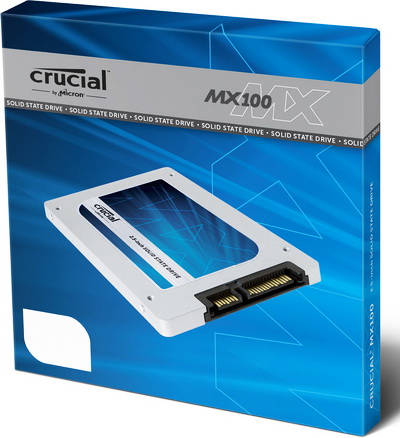INTRODUCTION

As technology progresses prices for current and previous generation devices keep falling and that has allowed solid state drives (SSDs) to become mainstream quite faster than many of us had hoped for when we first started to receive the very first ones to appear in the market roughly 6 years ago. Of course compared to regular mechanical hard disk drives (HDDs) the difference in price/capacity ratio is still somewhat large but at least now one can get an high performance 256GB SSD model for less than 0.7$ per GB. Price however is not the only thing that has improved the standing of SSDs in the market since with the appearance of 1TB models and the recent announcement of 2TB ones professionals can now have superior read & write speeds at very large capacities (always compared to the past). Crucial just recently announced their own offering for such audiences the mid-end MX100 SSD model which is currently available in 128,256 and 512GB capacities (with us we have the 512GB model).
Crucial.com is a leading online retailer specializing in computer memory (RAM) and solid state drives (SSD), and is operated by a subsidiary of Micron Technology, Inc., one of the world's leading manufacturers of computer memory products. Crucial.com offers more than 250,000 compatible products for nearly every computer system: home and business, old and new, PC and Mac® computers. Utilizing a suite of easy-to-use, free online tools, including the Crucial® System Scanner and the Crucial Memory Advisor™ tool, crucial.com makes it easy to find a compatible upgrade to improve computer performance and restore system reliability. For more information, visit www.crucial.com.
If we were to place the specs sheet of the brand new M550 right next to that of the MX100 we'd have a really hard time telling them apart since their sole difference lies on the MLC NAND flash modules used which are Crucial’s latest 16nm 128Gbit ones. Now compared to the 20nm ones used by the M550 the 16nm ones are quite cheaper to manufacture and are not really that slower in performance as you will all see later on. The MX100 also makes use of the same Marvell 88SS9189 NAND flash controller as the M550 so we also see features like AES 256-bit hardware encryption, power loss protection (via a row of tantalum capacitors), RAIN (Redundant Array of Independent NAND), TCG Opal 2.0 and IEEE-1667 which make the MX100 one of the rather few drives currently in the market fully compatible with Microsoft’s eDrive encryption. According to Crucial the MX100 also comes with an endurance rating of 72TB so nothing new here either. The one thing we really want to see however is how the MX100 compares to the highest-end M550 so without further delay let's find out.

 O-Sense
O-Sense









